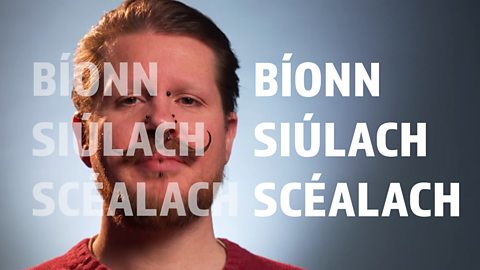BÃonn Siúlach Scéalach

BÃonn Siúlach Scéalach
He who travels has stories to tell
Nótaà d'FhoghlaimeoirÃ
If you have a ‘cúpla focal’;
Travellers have tales to tell.
As we see here there are only three words in this proverb a verb ‘bíonn’ (be) and two adjectives ‘siúlach’ (inclined to travel) and ‘scéalach’ (bringing stories)
As in most sentences in Irish the verb precedes its subject. Therefore our first word is ‘bíonn’ the third person present tense of the verb ‘bí’ (be). Unusually, there is no noun here expressing ‘traveller’. The absent noun is expressed by its adjective ‘siúlach’. The following adjective ‘scéalach’ is derived from the noun ‘scéal’ (story).
If you’re an advanced learner;
Travellers have tales to tell.
In this proverb we have the third person present tense of the verb ‘bí’ (be). The subject of the verb is an adjective ‘siúlach’ (inclined to travel), but it is understood to express an absent noun, i.e a traveller. ‘Siúlach’ is derived from the verbal noun ‘siúl’ (walk). The verb ‘siúil’ can mean walk or travel. ‘Shiúil mé Éire’ (I travelled throughout Ireland). ‘Scéalach’ (bringing stories) comes from the noun ‘scéal’ (story).
If you’re fluent but would like to improve your grammar;
Ciallaíonn an seanfhocal seo go mbíonn neart scéalta ag an duine a bhíonn ag taisteal cuid mhór.
D’fhéadfá a rá anseo ‘An té a bhíonn siúlach bíonn sé scéalach’. Ach is leor an dá aidiacht anseo leis na hainmfhocail ‘té’ agus an forainm ‘sé’ a chur in iúl.
Is minic a bhíonn eireaball leis an tseanfhocal seo ‘agus an té a bhíonn scéalach bíonn sé bréagach’ .i.e. is minic a dhéanann an taistealaí áibhéil nó a insíonn sé bréag lom.
Tabhair do d’aire go gcuireann an briathar in iúl an rud a dhéanaimid lenár gcosa ach ciallaíonn sé ‘taisteal’ chomh maith. Mar shampla, ‘siíúil mé an tír uilig’ = ‘thaistil me ar fud na tíre’.